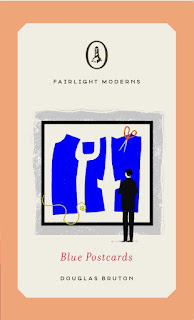Review: Blue Postcards by Douglas Bruton
None of these stories are to be trusted, for they are stories of the dead told by the living and the living always lie.
Bruton weaves together three fragmented narratives to create a story filled with passions that are never fully realised: that of the narrator, and his fascination both with Yves Klein and the colour blue; the lonely tailor, Henri, who sews a string of twisted blue Tekhelet threads into a seam in every suit he makes to bring the wearer luck; and Yves Klein, whose obsession with creating a blue pigment that would keep its original lustre may ultimately have led to his early death. Sprinkled into these stories are facts and anecdotes about the colour blue. The ancient Hebrews, for instance, created the dye for their Tekhelet strings from the excretions of a sea snail that turned an intense shade of blue when exposed to the sun.
The stories of Henri and Klein intersect when the artist comes to the tailor for a new suit, and it is here that we begin to understand the source of Henri’s melancholia. As a Jewish tailor in Paris, the son and grandson of Jewish Parisian tailors – and the last in his line, we see that life is not just about surviving. In the shattered pieces of his backstory, we too are weighed down by his grief. Then, for one brief moment, hope emerges from the ruins of the Street of Tailors and we foolishly allow ourselves to celebrate. Of all the characters we meet in Blue Postcards, it is Henri who touches us most deeply.
Klein, by contrast, is a showman. In him we see an artist whose obsession leads to his greatest feat – the creation of an illusion, where the viewer is encouraged to see something in nothing at all. Not only is Klein so bold as to exhibit eleven identical blue paintings in the same gallery, each marked for sale at a different price, but in the exhibition called The Void, he has the audacity to present an empty room – fixtures and fittings stripped away, and the walls painted white – as art. In the end, we are encouraged to believe that it is the perception rather than the artefact which matters. And we know this trick of the mind is true.
Written in 500 numbered paragraphs, Blue Postcards is
a bravely experimental and engaging novella with more than a postmodern twist.
Bruton juggles multiple stories, each with its own trajectory, and somehow
manages to keep them all in flight until the very end. This book is clever,
sensitive and thoughtful – a true piece of artistry, indeed.
*
Blue Postcards by Douglas Bruton is published by Fairlight Moderns, an imprint of Fairlight Books.
For more information about Douglas, see my interview with him HERE.




Comments